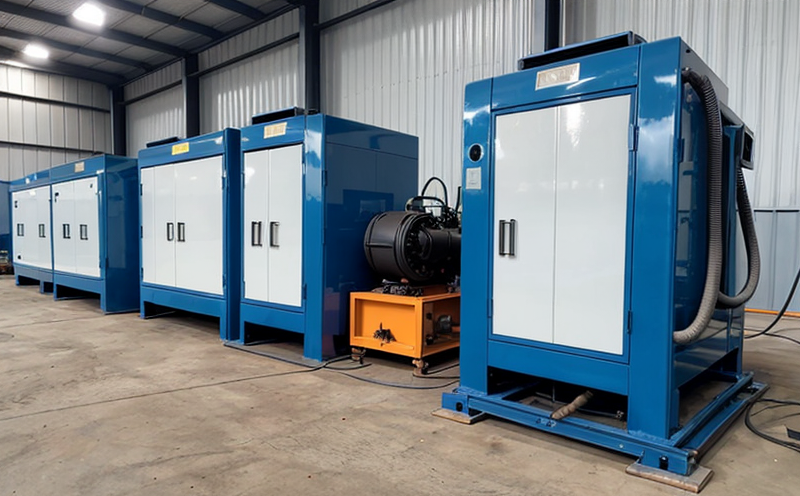Certification for Specialized Industrial Equipment: Ensuring Safety and Compliance
In todays industrial landscape, specialized equipment plays a vital role in various industries such as manufacturing, construction, and energy production. The safe and efficient operation of this equipment is crucial to prevent accidents, ensure productivity, and meet regulatory requirements. One way to guarantee the safe and compliant operation of specialized industrial equipment is through certification programs.
What is Certification for Specialized Industrial Equipment?
Certification for specialized industrial equipment involves an independent third-party evaluation of the equipments design, manufacturing, installation, and testing processes to ensure they meet specific standards and regulations. This process includes a thorough examination of the equipments safety features, performance capabilities, and compliance with relevant industry codes and guidelines.
Benefits of Certification for Specialized Industrial Equipment
The benefits of certification for specialized industrial equipment are numerous:
Improved Safety: Certified equipment has undergone rigorous testing and evaluation to ensure it meets specific safety standards. This reduces the risk of accidents and ensures a safe working environment.
Increased Efficiency: Certified equipment is designed and manufactured with efficiency in mind, leading to reduced energy consumption, lower maintenance costs, and increased productivity.
Enhanced Reliability: Certified equipment has been tested and validated to ensure it meets specific performance standards, reducing downtime and increasing overall reliability.
Compliance with Regulations: Certification ensures that the equipment complies with relevant industry codes, guidelines, and regulations, minimizing the risk of non-compliance fines and penalties.
Key Considerations for Choosing a Certification Program
When selecting a certification program for specialized industrial equipment, consider the following key factors:
Relevance to Industry: Ensure the certification program is specific to your industry or sector.
International Recognition: Choose a certification program that offers international recognition to ensure global compatibility and compliance.
Industry Expertise: Select a certification body with expertise in your industry or sector to guarantee relevant knowledge and understanding.
Audit Process: Understand the audit process, including the scope of work, timelines, and requirements for documentation.
Certification Programs for Specialized Industrial Equipment
Several certification programs are available for specialized industrial equipment. Some notable examples include:
API (American Petroleum Institute) Certification: API certification is widely recognized in the oil and gas industry, ensuring compliance with industry standards for drilling and extraction equipment.
ISO 9001:2015: This international standard ensures quality management systems meet specific requirements for design, manufacturing, installation, and testing of specialized industrial equipment.
UL (Underwriters Laboratories) Certification: UL certification is recognized globally for electrical equipment safety, including motors, transformers, and switchgear.
Certification Process for Specialized Industrial Equipment
The certification process typically involves the following steps:
1.
Pre-Audit Evaluation: A pre-audit evaluation assesses the manufacturers processes, documentation, and quality management systems to identify areas requiring improvement.
2.
Audit Preparation: Manufacturers prepare their equipment and documentation in accordance with the relevant standards and guidelines.
3.
On-Site Audit: An independent third-party auditor evaluates the equipment and manufacturing processes to ensure compliance with certification requirements.
4.
Corrective Actions: Manufacturers implement corrective actions as required by the audit results.
5.
Certification Awarded: Upon successful completion of the audit, manufacturers receive certification, typically valid for a specified period.
Detailed Information on Certification for Specialized Industrial Equipment
The following detailed information highlights key aspects of certification programs:
Auditing and Inspection Process: The auditing process involves:
Review of documentation, including design calculations, testing results, and quality control records.
Observation of manufacturing processes to ensure compliance with relevant standards.
Verification of equipment performance through on-site testing or inspection.
Identification of any non-conformities or areas requiring improvement.
Certification Scope and Requirements: Certification scope typically includes:
Equipment type (e.g., pumps, motors, gearboxes)
Operating conditions (temperature range, pressure rating, flow rate)
Safety features (emergency stop buttons, guarding, warning labels)
Performance standards (efficiency, accuracy, reliability)
QA Section
Here are some frequently asked questions and answers about certification for specialized industrial equipment:
1.
What is the purpose of certification for specialized industrial equipment?
Certification ensures that specialized industrial equipment meets specific safety standards, performance capabilities, and regulatory requirements.
2.
Who administers certification programs?
Independent third-party auditors or certification bodies administer certification programs, such as API, ISO, or UL.
3.
How long does the certification process take?
The certification process typically takes 6-18 months, depending on the scope of work, industry complexity, and audit frequency.
4.
What are the costs associated with certification?
Certification costs vary depending on the program, auditor fees, equipment testing requirements, and document preparation expenses.
5.
How often must certified equipment be re-certified?
Certified equipment typically requires recertification every 2-5 years or upon changes to design, manufacturing process, or industry regulations.
6.
What are the consequences of non-compliance with certification standards?
Non-compliance can result in fines, penalties, and potential liability for accidents or incidents related to certified equipment.
7.
Can I self-certify specialized industrial equipment?
No, self-certification is not a recognized practice, as it lacks the independence and expertise of third-party auditors.
8.
Are certification programs industry-specific or applicable across various sectors?
Certification programs can be specific to an industry or sector (e.g., API for oil and gas) or more general (ISO 9001:2015).
9.
How do I choose the right certification program for my specialized industrial equipment?
Select a certification program that aligns with your industry, equipment type, and regulatory requirements.
10.
What is the benefit of choosing a certified manufacturer over an un-certified one?
Certified manufacturers demonstrate compliance with safety standards, performance capabilities, and regulatory requirements, reducing risks associated with accidents or incidents related to their equipment.
In conclusion, certification for specialized industrial equipment plays a vital role in ensuring the safe and compliant operation of this critical equipment. Understanding the benefits, key considerations, and certification process can help manufacturers navigate the complexities of certification programs.

































